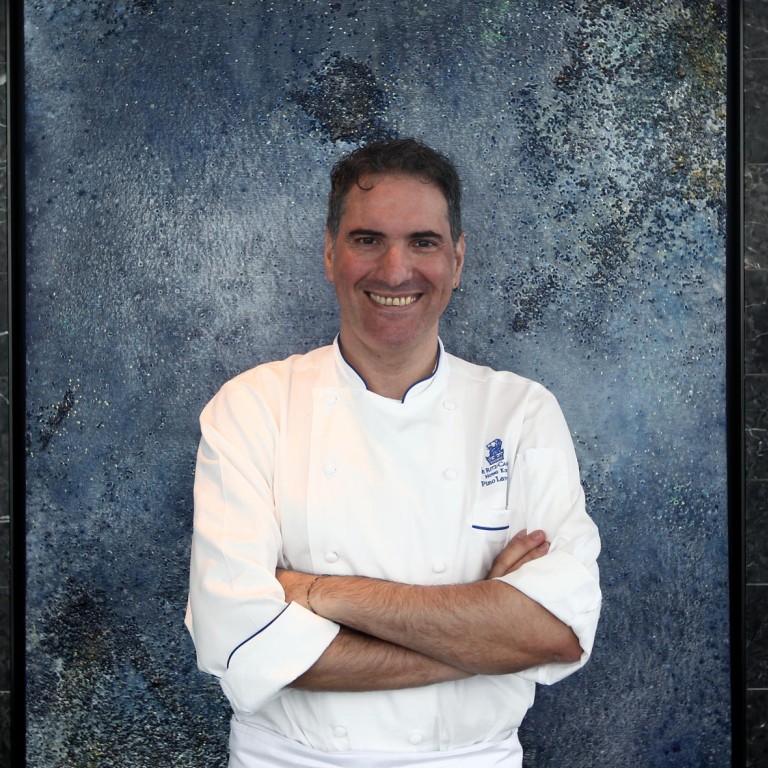
Taste for artistry
Michelin-starred Pino Lavarra showcases his Italian innovations at Tosca, writes Joanne Lam
Chef Pino Lavarra is somewhat of a performer. Dressed in immaculate whites and flashing a million-dollar smile, the two-star Michelin chef is focused as he sprinkles edible flowers on a plate as the finishing touch.
"Tosca is an opera," Lavarra says, referring to the famous musical that shares a name with his open-kitchen platform on the 102nd floor of The Ritz-Carlton, Hong Kong. "This is [my] stage."
Lavarra is the director of Tosca, the hotel's fine-dining Italian restaurant, which boasts not only a spectacular view of the city's skyline, but also a chance for diners to watch the celebrated chef work his magic. Besides putting on a "show" for his customers every day, Lavarra is an artist and innovator in his own right. His dishes are his canvases, with each culinary masterpiece a well-thought-out, multitextured treat for the eyes.
The plate he was working on earlier was a classic crab salad - but you wouldn't have been able to tell by sight or by its name, as the menu reads: "Crab Cookie with Roasted Langoustine and Veal Trotter". The diced crab salad is sandwiched between two thin cookies and perched daintily on a thin layer of puréed peas. Served on a matte-black plate, the presentation is far from traditional Italian fare.

Another one of his dishes, the sea tiramisu, plays on the classic dessert adored by many Hong Kong diners. It looks every bit the traditional delicacy, down to the sprinkle of coffee powder on top, but it is actually a savoury appetiser made from a cereal bar with seawater crumble on red prawn carpaccio, caviar and parsley pasta.
This is Lavarra's signature dish, fitting his culinary philosophy to create "traditional Italian food prepared in an innovative way". He finds joy in watching his diners take their first bite - sometimes cautiously - before smiling as the rush of rich, authentic Italian flavours burst in their mouths. Much of his southern Italian palate can be traced to his childhood and his mother, who worked as a school cook and had a simple yet nurturing style of cooking, which the chef recalls fondly.
In fact, his first memory of cooking occurred with his mother. "I made a pizza. I was so excited," he says. "I still remember everything we did - the smells, the touch - and it was very exciting." He was six years old at the time.
At age 14, Lavarra went to culinary school on a whim, having not seriously considered his career options, and friends and family questioned his choice. He laughs as he remembers his carefree response: "I said, 'I don't know. Let's try'."
He hasn't looked back. After completing his studies and working a few years in Italy, at the ripe age of 20, the chef began a culinary journey the world over, cooking first in Germany and later England. He also had a stint in Malaysia, where he discovered Asian spices and aromatic herbs, enhancing his flavour profile.
At the beginning of 2001, Lavarra returned to Italy and worked as executive chef of Rossellinis at the Palazzo Sasso hotel. One year later, he earned the title of "one of the best chefs in the world" from the American Academy of Hospitality Sciences, and the coveted gold star from Michelin.

"It was a dream come true," he says of his "unexpected" award. In 2004, he was awarded a second star, which the restaurant continues to boast today. It's an accolade the chef is obviously proud of, but he does not let the glory go to his head.
"Everything I do, I have to do [to] the best [of my ability] and take it to the highest level I can," Lavarra says. "I live with this excitement and determination to [constantly] do something new."
This mentality led him to Tosca in April last year. "Hong Kong is a new step, a new challenge," he says, adding that he had intended to start from scratch with this venture. "I want to put my ideas here in Hong Kong, which I believe is one of the best spots in the world to perform your [talent]," he adds. Since taking the helm at Tosca, Lavarra has made his mark on the local culinary scene, and his work has not gone unnoticed.
"In six months, I did what I did in two years in Italy," he says, referring to Tosca's first Michelin star, which was awarded at the end of last year.
So what is Lavarra's next challenge? For now, he is happy cooking at one of the highest-set restaurants in the world. But he still keeps on his toes. The chef challenges himself by coming up with a new amuse bouche every day - a feat he has achieved continuously for the past 10 years.
One can only imagine the pace at which his brain moves, morphing ideas into new and innovative dishes daily. But the creative process doesn't come easy. "Sometimes [new creations] can take half an hour," Lavarra says. "Sometimes they take 10 years."

